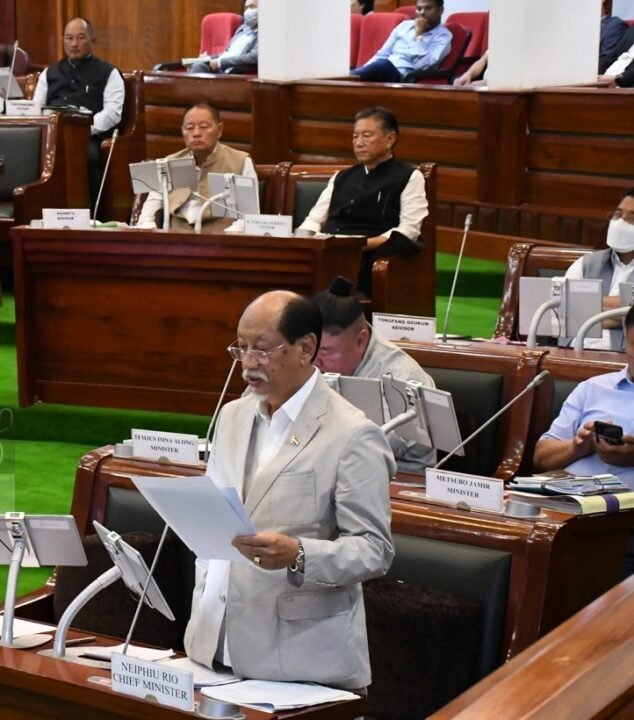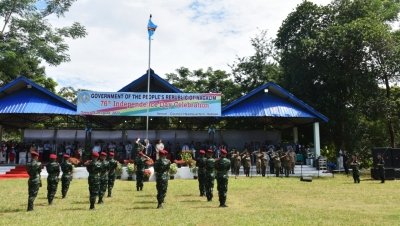KOHIMA, Sept 12: The Nagaland Assembly on Tuesday
unanimously adopted a resolution strongly urging that the state
be completely exempted from the purview of the proposed
Uniform Civil Code (UCC).
The 14th house of Nagaland legislative Assembly unanimously
resolves for exemption from the proposed enactment of UCC in
its application to the state of Nagaland, chief minister Neiphiu
Rio said moving the government resolution on the second day
of the monsoon session of the House.
“The Nagaland government and Naga people are of the view
that the UCC will pose a threat to customary laws, social
practices and the religious practices of the Naga people, which
will be in danger of encroachment in the event of imposition of
UCC,” he said.
The apparent objective of the UCC is to have a single law on
personal matters like marriage and divorce, custody and
guardianship, adoption and maintenance, succession and
inheritance, he said.
The Nagaland government through a cabinet decision
submitted its views on the subject to the Commission on July 4
conveying its opposition on the grounds of the “unique history”
of Nagaland since the pre-Independent British era, the
assurance of non-interference policy starting since pre-
Independence times and continued by the Centre in the social
and religious practices and customary laws of the people and
the constitutional guarantees given under Article 371A, Rio
said.
He also recalled that in the consultative meeting with various
stakeholders on the subject of UCC organised by the state
government on September 1, the representatives of the various
tribal organisations and civil societies have expressed their
strong resentment and objection to the idea of having UCC.
The Government of India (GoI) appointed the 22nd Law
Commission of India on February 21, 2020 and extended its
term up to August 31, 2024. It issued a public notice on June
14, 2023 inviting views and ideas from all stakeholders on the
subject matter of having a UCC throughout India, he said.
Article 371A of the Constitution mainly states that no act of
Parliament will apply to the state of Nagaland in a matter
relating to religious or social practices of Nagas, Naga
customary law and procedure administration of civil or criminal
justice involving decisions according to Naga customary law and
ownership and transfer of land and its resources will apply to
the state unless its Assembly decides so by a resolution, he
said.
The legislators on Monday deliberated on the consequences of
implementing UCC in the state and the Nagaland Speaker
Sharingain Longkumer had granted leave to the government to
bring a resolution on Tuesday.
Longkumer put the resolution to vote and it was adopted
unanimously by voice vote without any amendment. (PTI)
With inputs from NNN: Earlier on Monday, Nuklutoshi,
participating in the discussion regarding the Uniform Civil Code
(UCC), expressed concerns about its potential impact. He
contended that the UCC could be seen as a violation of the 16-
Point Agreement that led to the creation of the state.
Additionally, he asserted that the UCC might infringe upon
Article 371(A). Nuklutoshi emphasized the importance of the
role of people’s representatives in advocating for the interests
and concerns of the public. He stressed that as representatives,
they should vigorously defend the voices and rights of the
people they serve.
Achumbemo Kikon said that the UCC governs matters including
marriage and divorce, succession and inheritance, adoption
including other personal laws, though it is not enforceable in
the court of laws. Therefore, UCC should not come to our land
for whosoever reasons, he stated. Dr. Neisato Mero, said the
idea of uniform civil code is one nation one vote. It is also a
threat to our social, religion, customary laws, and direct
indulgence to our personal laws besides contradicting Article
371 (A), he added. Jwenga Seb, said UCC would have negative
implications on our personal laws and traditions though its
protection is clearly incorporated in the constitution of India.
Therefore, UCC be exempted for the state of Nagaland by
passing a resolution in the NLA.
Advisor, Labour, Employment Skill Development and Excise,
Moatoshi Longkumer, who participated in the debate, said that
the state government should oppose the introduction of UCC as
it not only overshadows the tenet of regulation but it also
threatens the pluralistic society. As such, he suggested that a
resolution be passed to oppose the introduction of UCC by the
NLA. Advisor, KT Sukhalu and MLA, Er. Picto also took part in
the discussion and in support for exemption of the Uniform
Civil Code.







